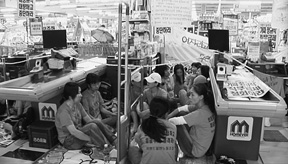Weabak: Stayed Out All Night
 KOREA / 2009 / Korean / Color / Video / 73 min
KOREA / 2009 / Korean / Color / Video / 73 min
Director, Editing, Producer: Kim Mi-re
Script: Kim Mi-re, Hye-young (Peng), Kyung-soon
Assistant Directors: Hye-young (Peng), Ja-kyung
Photography: Kim Mi-re, Ja-kyung, Ahn Chang-young
Sound: Mediact
Sound Editor: Pyo Yong-su, Kim Byung-oh
Sound Design: Pyo Yong-su
Music: Kim Byung-oh
Title Animation: Kim Young-ho
Illustration: Lee Ji-young
Source: Kim Mi-re www.mi-re.com
It’s June 30, 2007, the eve of the enactment of the Non-Regular Workers' Protection Bill. For the women employed by Homever, a major supermarket chain, tonight is the first time they will “stay out” since their wedding day. Anticipating this new law, Homever laid off large numbers of their part-timers, who comprise most of the female workforce. Outraged, the women occupy the checkout counters, lay down their blankets, and begin a sleep-in to protest this discriminatory treatment. They bring food and prepare meals while talking to each other about their thoughts. Singing, dancing, crying, and laughing during the 500-day struggle, these women create a space free from the family roles they ordinarily play.
Supported by: Feminist Active documentary Video festa
[Director’s Statement] Korean society requires working women to balance their jobs and family commitments. The primary jobs for women are their roles as mother and wife within the family, and their work is valued only in this context.
As a result, low wages, irregular employment, and the marginalization of the female workforce are considered justified. I think this prevents women from leading fully independent lives.
While female workers resist this kind of discrimination and unreasonable treatment, I wonder if progressive Korean organizations have properly supported the female labor movement. The progressive movement is male-dominated, and not only has there been no improvement over the last 10 years, it is now facing serious crises. Though there have been numerous campaigns and strikes by female workers in the past, they have been quickly forgotten and disbanded. I want to record the voices of women who resist discrimination and break out of the confines of the family to demand fundamental rights for workers—along with the glorious way they have carried out their struggle.
 Kim Mi-re
Kim Mi-reA documentary director/producer based in Seoul, Kim Mi-re was born on a small farm in North Chungcheong Province. She studied at Hankuk University of Foreign Studies in Seoul, where she majored in German. She sits on the steering committee of the Association of Korean Independent Film & Video. Her documentary filmmaking career began in 1998. Her films, many of which address the situation of the Korean working class, include Always Dream of Tomorrow (2001), Going Together Hand in Hand (2002), We Are Workers, or Not? (2003; Documentary Award, Fribourg International Film Festival), and Nogada (2005), a film on day laborers, which won the Human Rights Film Award at the Seoul Human Rights Film Festival. |
